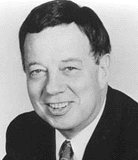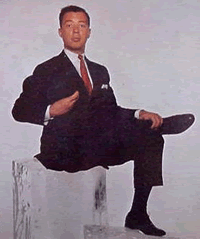


Cy Coleman Obituary
By Christopher Hawtree
|
His classical rigour and jazz flair shook up American popular song. Born Seymour Kaufman in 1929, in the Bronx, to Russian immigrants, May and Ida, he encountered, aged four, the piano left by a family which flit from a property run by his mother. He readily picked out tunes, and by seven played at Carnegie Hall. Trained at the New York College of Music, he learnt jazz while playing in servicemen's clubs. By the early Fifties he had a trio in various Manhattan boîtes, and began to write with Juilliard student Joseph McCarthy as lyricist. Some were recorded by Mabel Mercer, including Isn't He Adorable? and The Riviera ("where matrons draped in Paris fashions / Prolong the twilight of their passions"). If these brought him the cachet for which every songwriter hungered, any hunger itself was alleviated by the plangent I'm Gonna Laugh You Right Out of My Life - a big hit for Nat King Cole. Coleman and copywriter Carolyn Leigh had chanced upon each other, there and then deciding to work together, immediately, producing, fittingly, A Moment of Madness, soon followed by Witchcraft for Sinatra ("those fingers in my hair, / That sly, come-hither stare / That strips my conscience bare"). The collaboration was certainly fraught. Their first show, Wildcat (1960) was lumbered with a flash book, its star Lucille Ball, who seeks oil rights in a hick town. The well-known Hey, Look Me Over came into its own years later with a mellowed, Sinatra version. Little Me (1962) was another star vehicle, seven times over: adapted from Patrick Dennis's book by Neil Simon, staged by Bob Fosse, it featured Sid Caesar as the seven men in the heroine's life. Reviewers praised it, and hoped that his singing voice would improve; fact was, Caesar, hitting the hard stuff, was triumphant against the odds, resentful of Sven Svenson's showstopping solo, the finger-clicking I've Got Your Number, one of the sexiest songs ever written. If Little Me did not last as long as it deserved, it is more than a cult. The great collaboration broke up. Among those who think it a creative high is cabaret singer Bobby Short who made a classic, 1963 LP of Coleman's work, and, on Saturday, recalled a man who was "very genial, very kind and always encouraging while extremely private: somebody who, paradoxically perhaps, came alive on stage. People might not realize what a wonderful pianist he was - only six weeks ago he played at my eightieth birthday party - and, in fact, for all his Broadway success, he loved playing in small clubs. This was where he sprang from, he was always kept his ears open." In 1966, Coleman asked lyricist Dorothy Fields to work with him. She had begun in the Twenties but knew modern ways. Sweet Charity , based by Neil Simon on a Fellini movie about being on the make, grew into a full-length, over-long, Fosse staging with Gwen Verdon. Soggier than Simon's comedies, it needed the dancing and such songs as Big Spender; best is that hymn to New York My Personal Property, added for the Shirley Maclaine movie. Coleman's only other work with Dorothy Fields was the romantic comedy Seesaw (1974), another view of love in Manhattan, notable for It's Not Where You Start (It's Where You Finish). If the adaptation, with Michael Stewart, of the wife-swapping I Love My Wife (1975) seems a period piece, it endures, not least for the title-song. On The Twentieth Century (1978), from Ben Hecht's train-set play and movie, linked him with lyricists Betty Comden and Adolph Green. "An expectation of a 20's-style pastiche score didn't excite me musically," Coleman recalled. "We hit upon the idea of writing it as a comic opera... Our work sessions were so exhilarating that I found myself composing music on the spot... I doubt if we could have written the score if they hadn't invented tape machines." Coleman worked with lyricist Christopher Gore on several notable songs in the Seventies, including one about Atlantic City, around which Fosse wanted to build a show, but this faded with Gore's sudden death. As extravagant as On The Twentieth Century, again with Stewart as lyricist, was the circus-set Barnum (1980), who Jim Dale made his own in the visionary Colors of My Life. Set in a prison ward, Welcome to the Club (1989) sadly flopped, but that same year came City of Angels. Driven by a book from Larry Gelbart, he of M*A*S*H, and David Zippel's lyrics, this brilliant witty musical concerns the perils of adapting a hard-boiled novel for Hollywood; an unlikely popular success, it contains some of Coleman's most exhilarating music. Coleman lived for work, taking in such things as the 1984 movie Blame It on Rio and television specials for Shirley Maclaine. It was perhaps some surprise, worthy of any musical's plot, that in 1997 he married Shelby Brown, with whom he had a daughter Lily Cye, now aged four, upon whom he doted, and who will surely relish one of his last works, Pamela's First Musical, again with lyrics by Zippel, based on a children's book by playwright Wendy Wasserstein. As Bobby Short says, Coleman himself could write lyrics, too few of then, and, inevitably one now thinks of "will summer's end be the start / or will autumn break your heart?" The prolific Coleman had so much more to do. © Christopher Hawtree 2004 |
All rights reserved.......... © Jon Aldous 2006.......... Contact Me
 Songwriter
and pianist Cy Coleman had a "fondness for autumn, my strong
feeling that September is when exciting things start to happen".
Alas, then, he died, at 75, on Thursday, taken ill at a party for
the Broadway opening of Michael Frayn's Democracy. After five decades
in the business, with another revival of
Songwriter
and pianist Cy Coleman had a "fondness for autumn, my strong
feeling that September is when exciting things start to happen".
Alas, then, he died, at 75, on Thursday, taken ill at a party for
the Broadway opening of Michael Frayn's Democracy. After five decades
in the business, with another revival of  Adept
at many styles, Coleman's calypso and Latin rhythms were never synthetic,
but with a percussive, almost marching beat, brought out the lyrics'
intricately sassy wit . As columnist Rogers Whitaker remarked, "pepper
and salt and Tabasco sauce are the customary ingredients of a Coleman
ballad... whether the words that go with these songs are the effect
of the Coleman music or whether it is the other way round doesn't
matter; the end product is the entertaining spectacle of the American
swain bragging about his magnificence to his damsel and then conceding
that perhaps she is just as smart as he is".
Adept
at many styles, Coleman's calypso and Latin rhythms were never synthetic,
but with a percussive, almost marching beat, brought out the lyrics'
intricately sassy wit . As columnist Rogers Whitaker remarked, "pepper
and salt and Tabasco sauce are the customary ingredients of a Coleman
ballad... whether the words that go with these songs are the effect
of the Coleman music or whether it is the other way round doesn't
matter; the end product is the entertaining spectacle of the American
swain bragging about his magnificence to his damsel and then conceding
that perhaps she is just as smart as he is".
 A
contrast, back with Comden and Green, was
A
contrast, back with Comden and Green, was